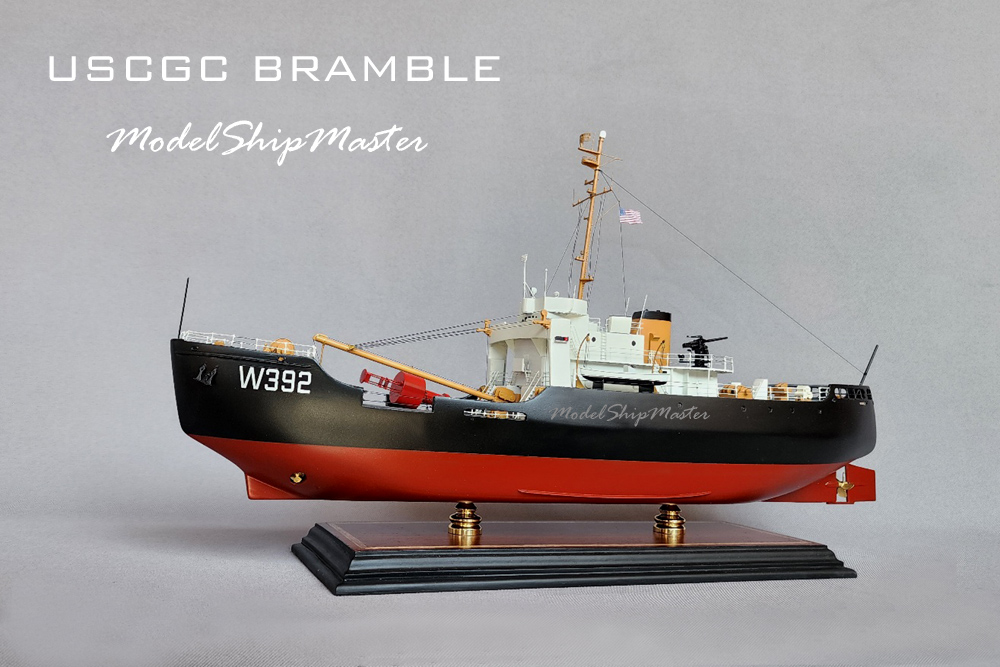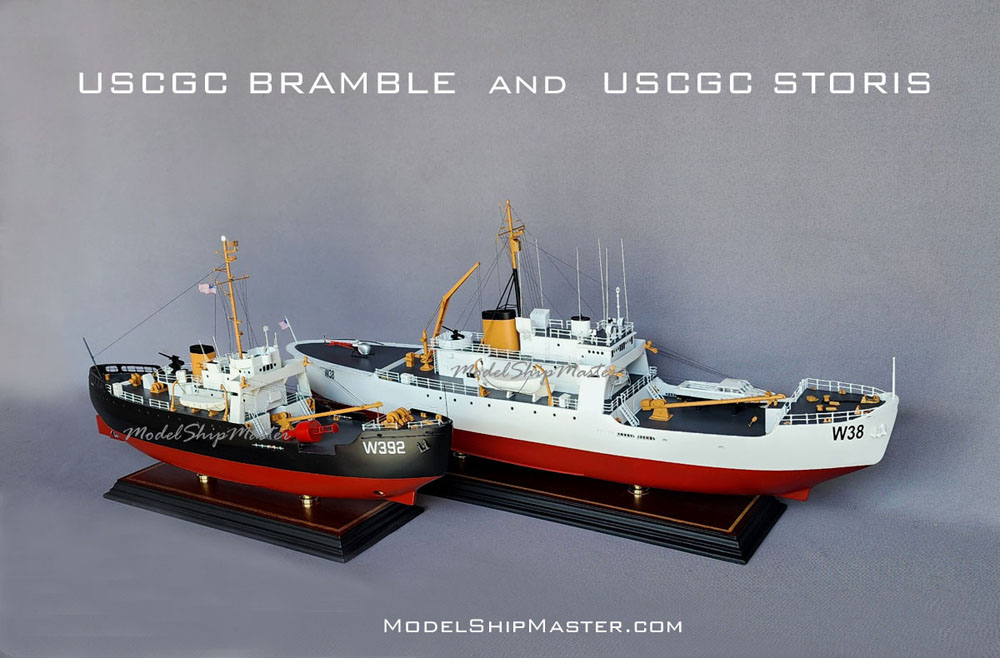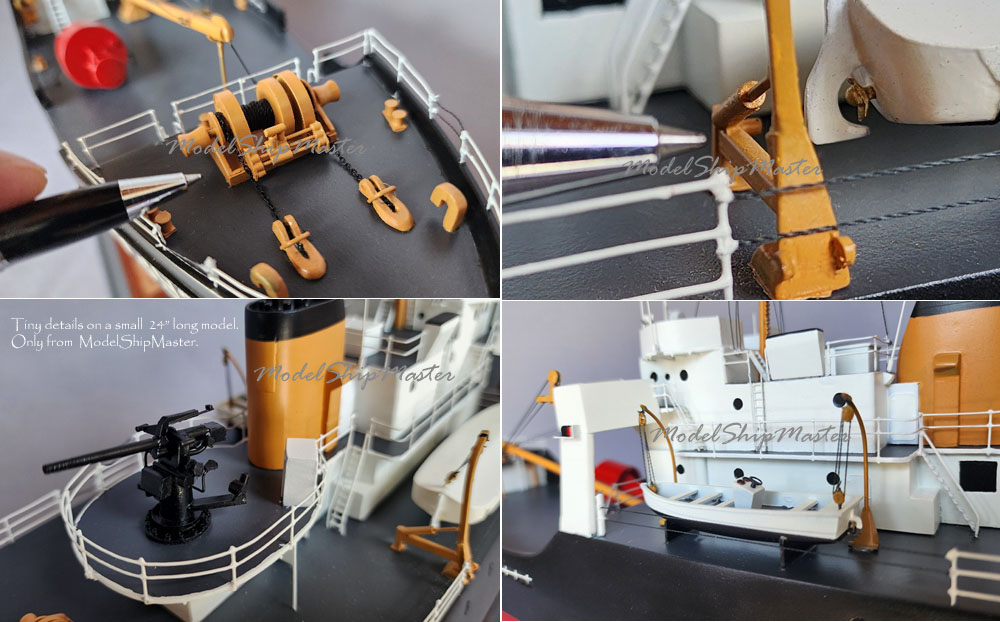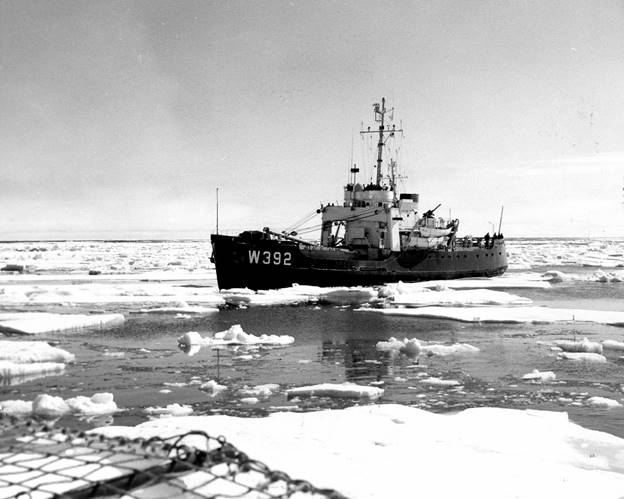|


256-bit encryption
$500,000 protection

|
USCGC BRAMBLE
USCGC Bramble is
one of the 39 original 180-foot seagoing buoy
tenders built between 1942 and 1944 for the United
States Coast Guard. From 1944 until 2003
she saw service in Pacific, Caribbean and Atlantic
waters as well as the Great Lakes.

Bramble
had a beam of 37 feet. She had a displacement of 935
tons and drew 12 feet. The new design was similar
to Juniper in appearance but did exhibit some important
differences. A notched forefoot, ice-belt at the
waterline, and reinforced bow gave the vessel
icebreaking capabilities. Finer lines at the bow and
stern increased the new tenderís sea keeping ability in
rough weather; an increase in draft also promoted
seaworthiness.
From July
to October 1947, Bramble participated in "Operation
Crossroads"-- the first test of an atomic bomb's effect
on surface ships, at Bikini Island.

In 1957 a circumnavigation of North America involved a
forced traverse of the Northwest Passage. Bramble and
the cutters Spar and Storis were
selected to attempt a forced passage along the northern
shore of Canada from the Pacific to the Atlantic Ocean.
This feat had been an ambition of mariners for over 400
years. Preparations for the difficult voyage included strengthening her bow to
withstand the tremendous pressures created by Arctic
pack ice. Bramble departed for this historic adventure
from Miami on 24 May 1957 en route to Seattle, WA via
the Panama Canal. On 1 July 1957 the task force departed
Seattle for the Atlantic via the Bering Straits and
Arctic Ocean. The ships traveled through 4,500 miles of
semi-charted water in 64 days to re-cross the Arctic
Circle into the Atlantic. The success of the mission
distinguished the three cutters as the first surface
ships to circumnavigate the North American continent.
Bramble completed a major renovation and overhaul in
1974, during which her engines were removed and rebuilt
and her berthing areas were expanded and modernized. A
new hydraulic boom was also installed. In addition to
her normal duties, Bramble was involved in some unique
missions. She frequently served as the Patrol Commander
for the Port Huron-to-Mackinac sailboat race. This race
started in 1925 and is one of the largest freshwater
sailboat races in the country, with an average of 300
boats competing each year. Bramble also set buoys for
the International Freedom Festival in the Detroit River.
On 22 May 2003, Bramble was decommissioned.
Throughout Bramble's service it was awarded many awards
and ribbons. She received the Department of
Transportation Gold Medal, CG Unit Commendation,
CG Meritorious Unit Commendation, CG "E" Ribbon, CG
Bicentennial Unit Commendation, American Campaign
Medal, WWII Victory Ribbon, National Defense Service
Medal, Arctic Service Medal and the Special Operations
Service Ribbon.

After decommissioning, Bramble became a museum ship,
docked at the Seaway Terminal, donated to the Port Huron
Museum. In August 2012 she was listed on the National
Register of Historic Places. In January 2013 the ship
was purchased by Robert B Klingler of Marine City,
Michigan. Some restoration was carried out and the ship
continued as a museum, also making occasional short
voyages. Bramble was used as the basis for the White
Portuguese ship featured in Batman v Superman: Dawn of
Justice.
In December 2018 Bramble was sold to Tom Clarke
of Roanoke, Virginia. He announced plans to send the
vessel to a Mobile, Alabama shipyard in Spring 2019 to
prepare her for a voyage from Miami, replicating the
circumnavigation of North America in 1957. This plan was
cancelled as Bramble's new owner ran out of funds, and
the ship was taken from him to be auctioned off
in Mobile, Alabama. On December 4, 2019 the Bramble was
sold at public auction by the United States Marshals
Service.
The 180-foot buoy-tending cutters built for the US Coast
Guard during the early 1940s are remarkable in terms of
their longevity. The 180s longevity is a function of
their design, not a case of superior construction,
though they were undoubtedly built quite solidly. The
180s were extremely versatile and perfectly suited for
their multifaceted role. They could break ice, replace a
buoy, and save a sinking ship all in the course of a
day's work. Moreover, they could complete these missions
across thousands of miles of ocean. They became outmoded
only when computers, satellites, and automation changed
the way ships are built and equipped. Obsolescence crept
up on the 180s very slowly, producing a tenure unmatched
in twentieth-century American maritime history. These
ships that fought U-boats in World War II have spent
millions of hours since making the world's waterways a
safer place for science, commerce, and recreation.
Often, the tenders carried out missions never envisioned
by their designers, ranging from transporting rare
tropical fish to landing scientific parties on drifting
icebergs. The oceangoing buoy tenders built for the US
Coast Guard in the early 1940s served around the world
and fulfilled the service's requirement for a true
multi-mission capable platform.

This Coast Guard
Bramble model is 24" long (HO 1/87 scale.) It
depicts the ship at the time of her historic voyage.
This model is in stock and
will be shipped within five business days. Email
us for price.
We also build the Bramble as before her
decommissioning.
We'd love to build for
you an ice water scenic base that shows the
three historic ships Storis, Spar, and
Bramble during their Northwest Passage voyage.
Just let us know.

Learn more about the Coast
Guard Bramble here:
https://en.wikipedia.org/wiki/USCGC_Bramble
https://www.history.uscg.mil/Browse-by-Topic/Assets/Water/All/Article/2409275/bramble-1944-wlb-392/

|